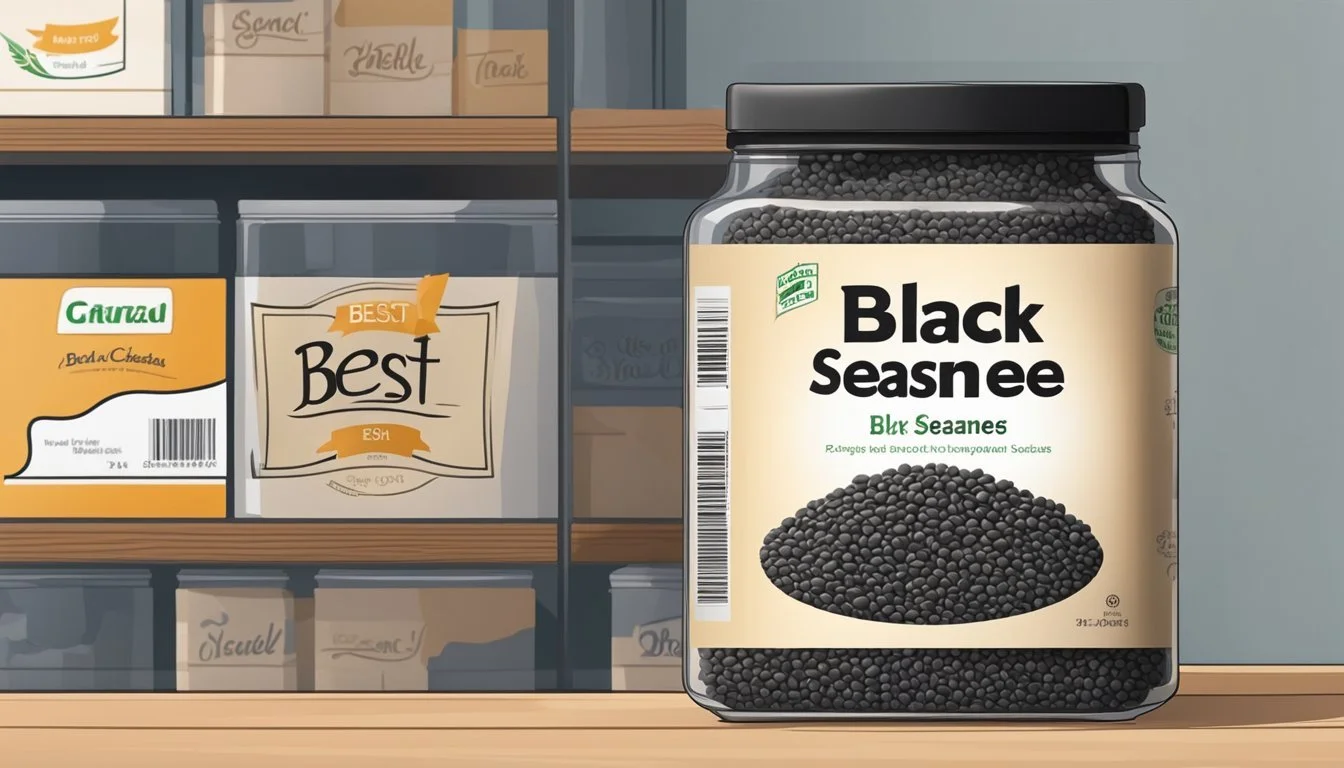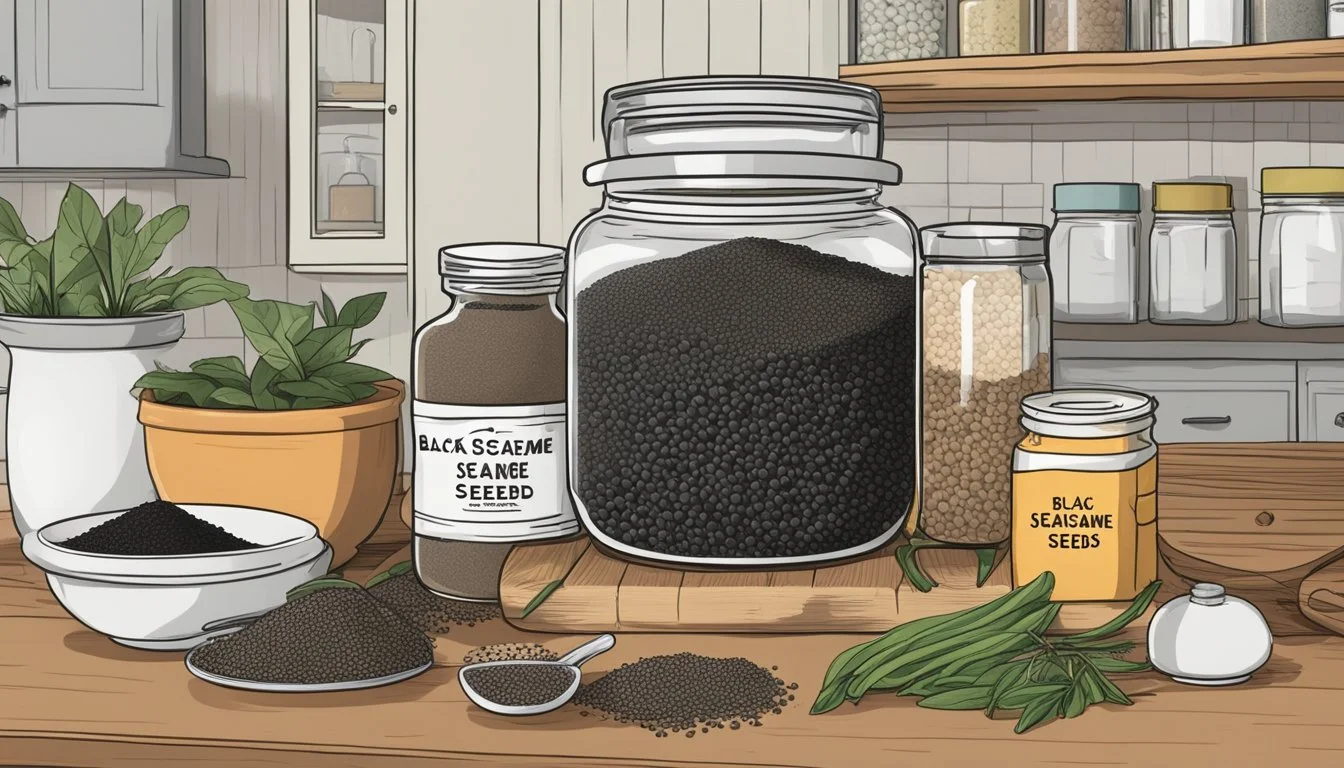How Long Do Black Sesame Seeds Last?
Shelf Life and Storage Tips
Black sesame seeds (how long do sesame seeds last?) prime is typically based on sensory cues. A change in taste to a bitter or sour flavor, or the detection of an off smell, can indicate that the seeds have spoiled. As such, consumers are encouraged to trust their senses and prioritize quality and safety when using black sesame seeds in their cooking.
Understanding Sesame Seeds
Sesame seeds are a widely used ingredient that come in various types and possess a rich nutritional profile. They originate from the Sesamum indicum plant and vary in their preparation methods, each impacting their longevity and flavor profile.
Types of Sesame Seeds
Raw Sesame Seeds: These seeds are hulled and unhulled, uncooked, and have a mild, nutty flavor. They are versatile for use in various cuisines.
Roasted Sesame Seeds: The seeds are roasted to enhance their nutty flavor. The roasting process can affect their shelf life, making them less durable than raw seeds.
Toasted Sesame Seeds: Similar to roasted seeds, but toasted at a lower temperature, typically used to garnish dishes for added texture and taste.
Nutritional Value
Sesame seeds are known for their high nutritional value. They are an excellent source of protein and contain healthy fats, specifically rich in linoleic and oleic acids. Additionally, they provide essential minerals like calcium, magnesium, and zinc.
Protein: Essential for muscle building and repair
Healthy Fats: Beneficial for heart health
Calcium: Vital for bone health
Magnesium: Supports metabolic health
Zinc: Crucial for immune function
Sesamum Indicum and Its Varieties
The precise variety of Sesamum indicum can impact the properties of the sesame seeds. Varieties include:
White Sesame Seeds: The most common, with a delicate flavor and used across many cultures.
Black Sesame Seeds: Lauded for their stronger flavor and higher nutritional content, they are a favorite in Asian cuisine.
Brown Sesame Seeds: Less common, with a more robust flavor, often found in Middle Eastern dishes.
Storage Fundamentals
To prolong the shelf life of black sesame seeds, one must prioritize optimal storage conditions. Such measures ensure the seeds retain their flavor, texture, and nutritional qualities.
Proper Storage Conditions
Proper storage of black sesame seeds hinges on maintaining a consistent environment that shields them from elements that can degrade quality. These elements include air, moisture, and light. Placing black sesame seeds in an airtight container is crucial to prevent exposure to air, which can hasten rancidity due to oxidation.
Ideal Temperature and Environment
The ideal temperature for storing black sesame seeds is at or below room temperature. They should be kept in a cool, dark place, such as a pantry or cupboard, away from any direct heat sources or sunlight. Storing them close to stoves, ovens, or windows can accelerate spoilage.
Containers and Sealing
One may choose between various containers for storage, such as:
Airtight containers: Preferred for keeping out air and moisture. These can be glass or food-grade plastic with tight-fitting lids.
Freezer bags: Suitable for freezing or refrigerating, they offer a seal that is both airtight and watertight.
Using these containers and ensuring a secure seal contributes significantly to maintaining the freshness of black sesame seeds.
Shelf Life Insights
In understanding the viability of black sesame seeds over time, one must consider their shelf life, signs of spoilage, and the impact that storage has on their longevity.
Shelf Life of Sesame Seeds
Black sesame seeds have a substantial shelf life, primarily due to their natural oils which preserve them under ideal conditions. Unopened and properly stored in a cool, dry place, they can last up to two years. Once opened, black sesame seeds maintain their quality for about six months to one year if stored correctly in the pantry. Refrigeration can further extend their shelf life, allowing them to stay fresh for potentially up to two years after opening.
Table: Estimated Shelf Life of Black Sesame Seeds
State Pantry Refrigerator Unopened Up to 2 years Up to 2 years Opened 6 months - 1 year Up to 2 years
Signs of Spoilage
The signs of spoilage in black sesame seeds can be detected through:
Smell: A sharp, bitter or rancid odor opposed to their naturally nutty aroma indicates spoilage.
Taste: A sour or bitter flavor is a clear indication that the seeds have gone bad.
Appearance: Any changes, such as discoloration or mold growth, suggest spoilage.
Texture: If the seeds have absorbed moisture and become soggy or sticky, they've likely spoiled.
Impact of Storage on Shelf Life
Storage conditions significantly affect the shelf life of black sesame seeds. To prevent seeds from becoming rancid or spoiling prematurely, one should adhere to the following storage recommendations:
Store in an airtight container to keep out moisture and contaminants.
Place in a cool, dry area away from heat sources and sunlight.
Refrigerate after opening, especially in humid environments, to extend freshness.
Consider freezing the seeds for long-term storage without significant loss of flavor.
Proper storage can help preserve the black sesame seeds' best by date and maintain their quality until the expiration date.
Maximizing Freshness and Taste
Proper storage methods are paramount to preserving the flavor, taste, and freshness of black sesame seeds. Maintaining the sweet and nutty flavor profile while avoiding bitterness due to spoilage is achievable with specific storage practices for unopened and opened sesame seeds.
Storing Unopened vs Opened Sesame Seeds
Unopened Sesame Seeds:
Place in a cool, dry place, such as a pantry or cupboard away from direct sunlight to prevent the seeds from becoming rancid.
Ensure the original packaging is sealed to protect the seeds from moisture and air, which can degrade their quality.
Opened Sesame Seeds:
Transfer seeds to an airtight container to limit exposure to air and moisture.
Keep the container in a cool, dry place, just like unopened seeds, to retain their distinct nutty flavor and freshness.
Refrigeration and Freezing Techniques
Refrigeration:
While refrigerating is an option, it is important to ensure the container is completely moisture-free to avoid seed spoilage.
Freezing:
Freezing sesame seeds is an effective technique for long-term storage.
Remove all moisture from the container or freezer bag before sealing.
Black sesame seeds can retain their quality for up to six months in the freezer.
When frozen, their flavor remains intact, retaining the desired sweet and nutty taste.
By following these guidelines, one ensures that the black sesame seeds maintain their peak culinary potential for a variety of uses.
Advanced Storage Techniques
To ensure that black sesame seeds retain their nutritional value and desirable flavor, advanced storage techniques focus on preventing rancidity and maintaining a fresh quality through freezing. Key factors such as the seed's oil content play a role in determining their shelf life, and proper methods can significantly extend it.
Extending Shelf Life through Freezing
Freezing is effective for keeping black sesame seeds fresh for extended periods. They should be stored in freeze-safe containers or bags, ensuring all moisture is removed before sealing. This method prevents spoilage and preserves both the seeds' nutritional value and taste. Freezing black sesame seeds in a cool, dark place like a deep freezer can prolong their usability far beyond regular pantry storage.
Procedure for Freezing:
Ensure the seeds are completely dry.
Place in an airtight container or zip-lock bag.
Expel as much air as possible before sealing.
Label with date of freezing for future reference.
Preventing Rancidity and Spoilage
The oil content of black sesame seeds makes them prone to developing a rancid odor when not stored correctly. To prevent spoilage, one must store the seeds in a cool, dark place such as a pantry, ensuring the temperature remains constant. The use of airtight containers is critical to keep out moisture and other contaminants. If refrigeration is preferred, especially after opening, the container's seal must be secure to avoid exposure to air, which accelerates rancidity.
Tips for Preventing Rancidity:
Store in tightly sealed containers.
Keep away from direct sunlight and heat.
Consider using oxygen absorbers to maintain freshness.
Perform regular checks for any signs of spoilage.
Usage Tips for Sesame Seeds
Utilizing sesame seeds effectively in cooking can enhance both taste and nutrition. These seeds can be a game-changer for a variety of dishes with proper use.
Incorporating into Recipes
To incorporate sesame seeds into recipes, one can embrace their versatility. They are a splendid addition to salads for a nutty crunch or can be toasted to unlock their flavor before being added to stir-fries. Here are specific ways to use sesame seeds:
Salads: Sprinkle raw or toasted sesame seeds over salads for added texture.
Stir-Fries: Toss them in during the last few minutes of cooking for a toasty flavor.
Taste Test before Use
Always perform a taste test before using sesame seeds in any recipe. Despite their long shelf life, sesame seeds can go rancid due to natural oil breakdown. If they have an off smell or taste, they should not be used.
Safety and Considerations
When it comes to the safety and longevity of black sesame seeds, understanding the health implications of spoiled seeds and the potential for pantry pests is crucial. Ensuring proper storage and attentiveness to these factors can prevent health hazards.
Health Risks of Spoiled Seeds
Spoiled black sesame seeds can lead to health risks if consumed. Seeds that have gone bad may develop mold, which can produce mycotoxins that are harmful if ingested, potentially causing digestive issues. Additionally, the presence of bacteria and other contaminants on spoiled seeds can pose serious health concerns.
Signs of Spoilage: Mold growth, off odor, discolored seeds.
Prevention: Keep seeds in a cool, dry place; monitor expiry dates.
Dealing with Pantry Pests
Pantry pests, such as weevils and moths, can infest black sesame seeds. They lay larvae that can contaminate your seeds.
Prevention Methods:
Store in air-tight containers.
Regularly clean pantry shelves.
Inspect new purchases for signs of infestation before adding them to your pantry.
By being vigilant about storage conditions and regularly inspecting your black sesame seeds, risks can be minimized.
Frequently Asked Questions
In this section, the crucial insights into the longevity and storage practices of black sesame seeds are addressed through common inquiries.
Can You Freeze Sesame Seeds?
Freezing sesame seeds is indeed a suitable method for long-term preservation. To maintain their quality, one must ensure that the seeds are completely dry and stored in an airtight container before placing them in the freezer. This process helps in extending their shelf life significantly beyond their best-by date, provided they are stored correctly.
How to Identify Expired Seeds?
Black sesame seeds that have expired can often be identified through a distinct change in their aroma, flavor, or appearance. They may develop a rancid or off smell, have a bitter taste, or present a dulled coloration. If any moisture has been introduced during storage, one may also observe mold growth, which indicates spoilage and the seeds should be discarded.
Determining Quality after Long-Term Storage
Evaluating the quality of black sesame seeds after extended storage involves both a visual inspection and taste test. If the seeds retain their characteristic black color and nutty flavor without any signs of bitterness or rancidity, they can still be considered good to use. It's worth noting that proper storage technique — cool, dry conditions away from direct sunlight — is central to preserving their quality over time.
Conclusion
Black sesame seeds, with their rich nutty flavor, are a healthy addition to various dishes. When stored properly in a cool, dry place, these seeds can last for up to two years beyond their packaged best-by date. It's important to store them in an airtight container to prevent moisture and air from spoiling them.
Shelf Life:
Raw: Up to 2 years.
Roasted: Approximately 1 year.
One can assess their quality by:
Smell: Fresh seeds have a nutty aroma. A rancid or sour smell indicates spoilage.
Taste: A slight bitterness is natural, but an overly strong or off taste suggests they are past their prime.
Appearance: They should retain their characteristic black color without any white or discolored mold spots.
In summary, black sesame seeds have a considerable shelf life, and their longevity can be maximized through correct storage practices. While they may be safe to consume past their expiration date, sensory cues like smell, taste, and appearance are essential to determine their actual freshness. It is always best to discard any seeds that show signs of spoilage to ensure food safety.









